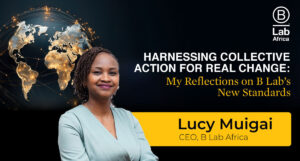
Business start-ups from across Africa are beginning to become aware and integrate sustainability and impact measurement into their corporate agendas and management strategies in order to develop their long-term potential.
“Entrepreneurs don’t just want to build businesses, they want to be able to build businesses that change the world,” said Benjamin Bimanywaruhanga, head of machine learning and pharmacovigilance expert of Mfyeti, a health-tech company in Uganda.
With the support of NTF IV, B Lab East Africa hosted a 3-part interactive online training for 77 companies from Uganda, Tanzania, Rwanda, Zambia and the Gambia aimed at encouraging entrepreneurs to redefine business success to include overall impact on all their stakeholders.
“I was surprised by the magnitude of what I learned,” said Bimanywaruhanga.
The training encouraged entrepreneurs to think about success not just in terms of profit but in the overall impact they have on all their stakeholders, including employees, customers, the community, and the environment.
“Our objective was to make businesses understand that when you measure this impact, you are better able to clearly articulate and share you story with investors, increase your credibility and stand out against competitors,” said Lucy Muigai, B Lab East Africa’s head of operations, who led the webinar.
IMPACT MEASUREMENT TOOLS
“We wanted to give the participants applicable business skills. Companies cannot manage what they do not measure, so B Lab developed free web-based solutions: the B Impact Assessment, and SDG Action Manager, developed out of a collaboration between B Lab and the UN Global Compact,” said Muigai.
Working closely with the NTF IV team helped, Muigai said. “They understand the start-ups, so it was easier for me to curate the material and deliver the training successfully, including the tools that we offer.”
The B Impact Assessment is a free, confidential, industry specific online tool that companies can use to measure, manage, compare and improve a company’s social and environmental impact through the lenses of governance, employee wellbeing, community, environment and customers.
WHO ARE THE STAKEHOLDERS?
Chipeka Chilenga, marketing assistant coordinator for Vitalite in Zambia, said she originally attended the webinar in order to improve the company’s processes of gathering success stories from the largely lower income customers who purchase the company’s solar energy products.
What she learned was much more comprehensive and has led her to developing new ideas for a business plan based on sustainable brand and marketing alignment. Her goal is to systematically measure and analyze Vitalite’s social impact as a means to setting a baseline for future development and growth.
“There were discussions on topics I had not thought about. For example, that impact is on all stakeholders who experience change, and that includes employees,” Chilenga said.
“I want take a step back and really look at what is it that we were created to do, look at where we are now, and draft a plan detailing what outcomes are we trying to achieve, then have we achieved that, and where do we want to go going forward,” she said.
Bimanywaruhanga of Mfyeti is also looking at making changes. “Initially when we were hiring, we were going for the lowest payment, but you can no longer think that way. We can offer good salaries to empower our workers. I am also thinking about having more women on our team,” he said.
IMPACT AND PROFIT
“Balance sheets are important for Europe and US-based investors but showing impact can give businesses an edge,” Bimanywaruhanga added. “So it’s good to understand how to quantify our social or environmental impact and how to appeal to investors,” he added.
B Lab administers the B Corp certification for businesses that have met the highest standards of verified social and environmental performance, public transparency and legal accountability to balance profit and purpose.
Two B Corps – Endiro Coffee, a coffee company in Uganda and Abahizi Rwanda, a fashion accessories producer in Rwanda — shared their impact journey with the training participants group, Muigai said. Both companies are exporting to developed markets.
“These are businesses working with rural communities and trying to create jobs. Just hearing about their impact, their employee engagement, and how they are doing good work while making money, that hit home,” said Muigai.
About the author:
The Netherlands Trust Fund (NTF) IV is based on a partnership between the International Trade Centre and the Dutch Centre for the Promotion of Imports from developing countries and funded by the Dutch Ministry of Foreign Affairs.





